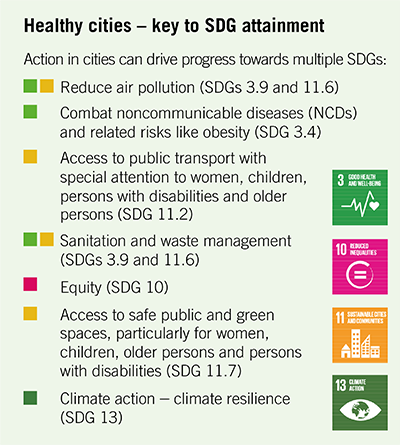Policies and progress
Sustainable Development Goals (SDGs) in Urban Health

Health is a precondition for and an outcome of sustainable development, particularly in cities. The Agenda for Sustainable Development acknowledges the importance of health in the context of “ensuring healthy lives and promote well-being for all” (SDG 3), “reducing inequality within and among countries (SDG 10),” “making cities inclusive, safe, resilient and sustainable” (SDG 11) and “taking urgent action to combat climate change and its impacts (SDG 13).”
To achieve these and all SDGs, cooperation between different stakeholders and institutions is urgently needed – not only to make the best use of finite resources, but to capitalize on synergies and ensure policy coherence to achieve systemic change. Acknowledging health as a central component of urban planning and governance cities will be better positioned to deliver on this vision of sustainable urban development for all.
Health-related indicators can be used to measure progress of sustainable development policies related to cities, food and agriculture, energy, and water and sanitation - particularly policies with health and equity co-benefits like reducing greenhouse gas emissions and increasing resilience to environmental change. Health indicators reflect progress on social equity, environment, and development of sustainable cities. Core indicators include:
- urban air quality in terms of particulate pollution, with respect to WHO air quality guidelines;
- slum housing improvements that benefit health, as assessed by well-defined measures for safe, resilient, and climate-adapted structures with access to clean energy and basic utilities;
- healthy, efficient transport, in terms of safety and use of sustainable modes, including walking, cycling, and public transport;
- urban violence, in terms of intentional homicides.
Governance indicators assess how cities account for health in urban planning and building codes, and in monitoring of air and water quality and sanitation risks. Furthermore, indicators of urban services essential to public health and sustainable cities can include: access to health care services, green spaces, fresh food markets, and waste management.
Developing sustainable and healthy cities will require a significant improvement in the lives of slum dwellers. However this has been hampered by the lack of available data with few countries reporting on all five parameters used to define slum households access to:
- durable housing structure;
- sufficient living area;
- safe, affordable water;
- improved sanitation; and
- security of tenure.
With the exception of the indicator for slum improvements, most indicators proposed here are already collected by UN agencies, national governments, or by cities themselves.
